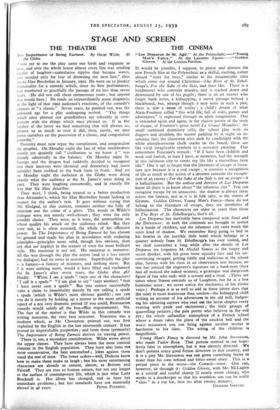THE CINEMA
",Les Disparus de St. Agil." At the Polytechnic.-1, Young Man's Fancy." At the Leicester Square.—" Golden Gloves." At the London Pavilion.
IT would be possible, I suppose, to praise and dismiss the new French film at the Polytechnic as a skilful, exciting, rather absurd " story for boys," similar to the innumerable tales which come out around Christmas—The Boys of St. Ethel- burga's, For the Sake of the Side, and their like. There is a headmaster who commits murder, and is tracked down and denounced by one of his pupils ; there is an art master who forges bank notes, a kidnapping, a secret passage behind a blackboard, but, strange though it may seem in such a plot, there is also a sense of reality ; a child's dream of what Alain-Fournier called "this wild life, full of risks, games and adventures," is expressed through an adult imagination. One is reminded again and again, in the elusive poetry of the story of escape, of Fournier's great novel Le Grand Meaulnes: the small curtained dormitory cells, the school play with its daggers and doublets, the master padding by at night on in- somniac feet, the classroom after dark by candlelight with the white phosphorescent chalk marks on the board, these arc like vivid inexplicable symbols in a surrealist painting. One remembers Fournier's remark: "If I have been childish and weak and foolish, at least I have, at moments, had the strength in this infamous city to create my life like a marvellous fairy tale." One is apt to forget that the literature of escape is litera- ture just because it is a real escape ; it contains a recognition of life as much as the action of a deserter contains the recogni- tion of an enemy ; For the Sake of the Side is not an escape—it is hallucination. But the author and director of Les Disparus know all there is to know about " the infamous city." You can recognise escape by its unsuccess: the shadow is always there across the fantasy, just as it is in folk tales, in the stories of Grimm. Golden Gloves, Young Man's Fancy—these do not belong to the literature of escape, they are novelettes of hallucination. The characters are older in years than those in The Boys of St. Ethelburga's, that's all.
Les Disparus has inevitably been compared with Emil and the Detectives: in both the criminals are brought to justice by a horde of children, and the infamous city casts much the same kind of shadow. We remember Rasp going to bed in his bowler in the horrible little hotel which belongs in a quarter nobody from St. Ethelburga's has ever visited, and we shall remember a long while after the details of Les Disparus are forgotten M. Michel Simon as the forger and secret drinker, with his great loose squashy face and his un- convincing swagger, getting tiddly and malicious at the school play, furious with his class in an observation test because no one has noticed the engraver's signature on a bank-note (they had all noticed the naked women), a grotesque and dangerous figure of fun who ends with a scream and a thud. (There are times when Simon reminds us of Laughton, but he is a less histrionic actor : we never notice the mechanics of his elastic voice.) Perhaps it is as well to add in these jittery days that the story is more humorous than sombre—the kidnapped child writing an account of his adventures in the old mill, badger- ing his admiring captors who read out the latest chapter every evening with pride and excitement ; the little groups of quarrelling pedants ; the pale porter who believes in the evil eye ; the whole unfamiliar atmosphere of a French school where a drum takes the place of the cracked bell and the worst accusation you can bring against another master is harshness to his class. The acting of the children is magnificent.
Young Man's Fancy is directed by Mr. John Stevenson, who made Tudor Rose. That picture seemed to me hope- lessly false in atmosphere, but it was cleverly directed. We don't possess many good fiction directors in this country, and it is a pity Mr. Stevenson was not given something better to make than his own refined and bitter-sweet story. This is a period piece in the worse—the Coward—sense. One can, however, sit through it: Golden Gloves, with Mr. McLaglen as a retired and tearful champ (I nearly wrote chimp), who works as a doorkeeper so that his worthless son can be really " class " in a top hat, beat me after twenty minutes.
GRAHAM GREENE.








































 Previous page
Previous page